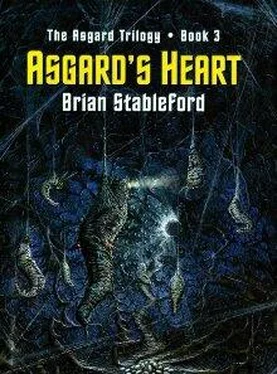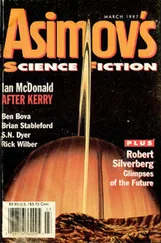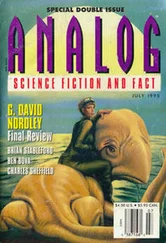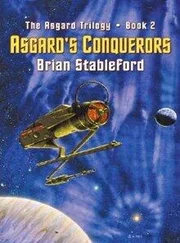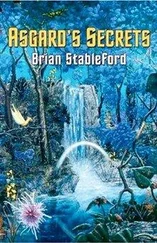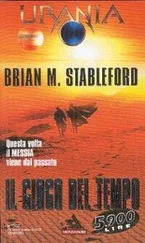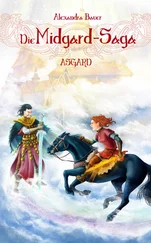The bridge at the hind end of the ship was a paltry affair, consisting of a raised deck protected only by an ornately-carved railing. There was a wheel controlling the rudder (though that seemed to me to be as anachronistic as Medusa or the ramming-spur), but no substantial wheelhouse.
I found myself gripping the rail very tightly, bracing myself against the rolling and yawing of the ship.
I had never been on a ship before—the closest I had ever come to an ocean was driving along the shore of one of the icebound seas on the surface of Asgard. That had certainly been grey, but the way the bergs floated in the shallow water had made it seem utterly serene, while this water, in spite of its apparent viscosity, had an obvious inclination to the tempestuous.
I felt, paradoxically, that I should have been seasick, or at the very least uneasy and uncomfortable. In fact, I did not. The best attempt I can make to describe what I felt like is to say that I felt mildly drunk—at precisely that pitch of intoxication where the befuddled brain seems disconnected from the body, anaesthetised and incipiently dizzy. I felt unreal, and that seemed to me to be an utter absurdity, because I knew full well that from the viewpoint of my parent self I was unreal. I had been copied into a dreamworld, but there was surely a ludicrous impropriety in the fact that I felt like a dream-entity.
Had I, I wondered, any instinct to survive in my present form? Had I sufficient strength of will to continue to exist from one moment to the next?
Oddly enough, that was a frightening thought. I did not feel like myself—and knew, indeed, that in a sense I was not myself, and that there was another, very different self walking away from the interface in the solid world of Asgard’s physical mass. And yet, I was all the self I had, and I knew that this splinter-consciousness, however drunk with its own absurdity it might be, was an entity capable of being destroyed, and that such destruction would be no less a death than would one day overcome my fleshy doppelganger.
I looked around, and found that I was not alone. Mercifully, I was not the only volunteer who had come forward to undertake the high road to the Centre while his solid self attempted the low. Myrlin was watching me. He needed no rail to assist in his support, but seemed quite steady on the deck, riding its movements with casual ease. He seemed no bigger here than he had in the flesh, but that had always been quite big enough—in the flesh he was a two-metre man with a lot to spare, and his ghost-self here retained the same appearance of hugeness. But he did not look real. As I met his gaze, which was as curious and as puzzled as my own, I had to admit that he looked no more authentic than the silly ship on whose deck we stood. He too was more like a cartoon image than a real man.
He was dressed in armour, which was black and shiny, as if lacquered or highly polished. Its sections were moulded so accurately to his body that it looked like an exoskeleton.
He was bare-headed, though, and his colouring was subtly altered. His hair was lighter, although it tended more to auburn than blonde, and his eyes were so bright in their greyness as to seem almost silver.
In his right hand he was carrying a huge sledgehammer, whose head must have weighed at least a hundred kilos, although he seemed to feel not the slightest discomfort in bearing it. He had a large sword in a scabbard at his belt. Despite his seeming inauthenticity, I could not help but feel that this was the role for which fate (as opposed to the cunning Salamandrans) had shaped him. As a barbarian warrior he was somehow convincing, whereas the real android, set against the backcloth of Skychain City and the deeper levels of Asgard, had always seemed awkwardly out of place.
I looked down at my own body, to see what I might be wearing, and found that I was armoured too, though in a slightly different fashion. It was as though I had garments knitted from fine steel thread, which seemed both very strong and very light. Like Myrlin’s, my armour was lacquer-bright, but my colour was a dark red, the colour of burgundy wine.
I hoped that I wouldn’t present too tempting a target, if and when things warmed up.
Looking down, I could see the backs of the hands that gripped the rails. I felt a slight rush of amused relief as I realised that I knew them. I knew them like the backs of my hands… although I was not aware that I had ever paid particularly scrupulous attention to them in my former life. Perhaps it was only in my mind—a reassurance, which I needed, that I was still who I was, really and truly.
I had a sword and a scabbard of my own. The weapon looked big and cumbersome, but it didn’t feel that way. It wasn’t only that it felt light—it felt as if it had a strength of its own, and perhaps an innate skill, which I only had to liberate. This was a magical sword, and that status seemed no more absurd than the fact of my existence here, for this was a world where all was magical, where the laws which regulated other spaces and times could be modified at will, if one only knew how and had the faith that one could do it.
I had another weapon too—a big longbow, leaning upon the rail beside my hand. It didn’t fall or bounce around when the ship lurched, and I guessed that it, too, had a competence of its own. There was a quiver of arrows behind my shoulder, Robin Hood style.
Bring me my bow of burning gold, I quoted silently, with drunken eloquence. Bring me my arrows of desire! And then, in more sombre mood: Things fall apart; the centre cannot hold; mere anarchy is loosed upon the world… The blood-dimmed tide is loosed, and everywhere the ceremony of innocence is drowned…
I turned again to look at the third person who was standing on the small raised section of deck. She had moved to stand by Myrlin, and was watching me studiously. It wasn’t Susarma Lear, though she had some of Susarma’s features. I had seen her many times before, looking out at me from her crazy looking-glass world, always behind an invisible but solid barrier—not really there at all.
Now, she was really here. Or, to be strictly accurate, I was “really” there.
Her dark hair was still worn long. It hung, straight and sheer, almost to the middle of her back. She was all Amazon now, though, in armour like mine in style, but burnished dark gold. Her eyes were brown, but like Myrlin’s eyes they had an inner glow that made them seem bright, as though they were radiant with heat. She was carrying her own bow, as tall as she was, and her own quiver of arrows. She had a sword, too, but she didn’t seem unduly burdened. She did look real—though that was undoubtedly a consequence of my knowing that she really belonged here. She was the Nine, and she didn’t need to become a caricature to take the appearance of Pallas Athene, warrior goddess—the role was already hers, custom-made.
I took my hands off the rail, and stood upright, slightly surprised to find that I could do it.
“You chose this,” I accused her. “We could experience this according to any scheme of interpretation—any framework of appearances that we cared to import. Why didn’t you give us Star Force uniforms and flame pistols? Why not an armoured car and a road to drive it on? We could have felt at home there. Why this fantasy… this fairyland?”
“Do you remember what happened to Amara Guur when you fought him in the flower garden?” she countered. “Do you remember why he couldn’t fight effectively?”
I remembered. Unlike me, he’d never been in low-gee before. When the fight started, his instincts took over, and all his reflexes were wrong. He was betrayed by his own skills.
She saw that I understood. “This isn’t the world you’ve always known,” she said. “If I were to make it look like that world, you’d be forever trying to act as if it were. Here, you must act on this world’s terms. We have a great deal of latitude in converting our experience into pseudo-sensory interpretations, but we don’t have complete freedom. The constraints this world exercises on the way you can see and manipulate it are weaker than the constraints of the world where your other self lives, but there are constraints. There is an actuality here, which must be accepted in order to be dealt with.”
Читать дальше
